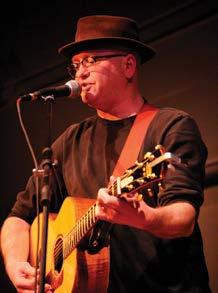
4 minute read
Dedication to art Buffalo Music Hall of Famers talk passion for music
BY ELIJAH ROBINSON
Buffalo’s music scene is strong enough to support a Hall of Fame, which is full of passionate, talented musicians, many of whom have made music since they were young. Faced with the challenges of making a career from music, these musicians found ways to follow their hearts and enrich the culture. We talked to the five inductees—Jeff Miers, Janice Mitchell, Alison Pipitone, Maria Sebastian, and Tom Stahl—on how they built their careers and continue to contribute to the local music scene.
How were you initially exposed to music?
Jeff Miers: My parents had a small but vital record collection. Though neither were musicians, they had impeccable taste.
Janice Mitchell: In my early years I used to sing with the gospel choir at our church and enjoyed singing harmonies around the house with my sisters. When I was about ten, I was mesmerized when I saw Nancy Wilson and Nina Simone in concert at Kleinhans and that’s when I knew what I wanted to do.
Alison Pipitone: I grew up in a family that loved music. Lucky for me all that amazing music got embedded in my DNA.
Tom Stahl: The Monkees were on TV as well as the Partridge Family, the Banana Splits and the Beatles cartoon...Mom was always singing around the house and I’d raid my older brothers record collection. My older sister was an actress and singer.
Maria Sebastian: People who do what I do are usually born to do it, and it’s usually the same story: we come from at least one musical parent (who likely did not have the time to develop their own talent let alone ours), they realize young they want to perform, and they spend the rest of their lives trying to make a living doing it.
When did you decide to embark on a career in music?
Miers: I distinctly remember being five years old and telling my mother “I’m going to be a musician when I grow up.” I’ve never wanted to be anything else.
Mitchell: I had been working with some local bands and, after attending UB and starting my studies in their School of Pharmacy, I realized that was not where my heart was. I [moved] to Los Angeles, and that’s when I started actively pursuing music.

Pipitone: My siblings and I were separated during some formative young years. When I was eighteen, it was the first time in a long time that four of us were together. Our first big move was to form a band!
Stahl: I’d had a couple back surgeries and the doctor recommended a new line of work. While recuperating, I wrote a couple of songs, and my wife insisted I go sing them.
Sebastian: I’ve been playing live since I was sixteen.
What was the biggest challenge you faced?
Miers: Learning music, becoming adept at expressing yourself through an instrument, developing your own voice as a musician, putting in the 10,000 hours it takes to become more than an amateur. These challenges continue no matter how long you’ve lived and played. But the biggest challenge has always been finding a way to finance a life in music.
Mitchell: Survival. Getting started, it was hard to get music income generated in an unfamiliar city. Taking on other jobs robbed energy and attention from the music pursuit.
Pipitone: We faced lots of challenges as we went through personnel changes and rose through the ranks of the LA music scene. But we were so dedicated that challenges were just fuel for the fire.
Stahl: I was thirty-five with a wife and young son, so at the end of a gig, I was just trying to get home. I knew nothing about the business or networking. I opened for Joan Osborne at Nietzsche’s; I had an encore, which is apparently a good thing for an opener. At 11:30 p.m., I was done, so I went home. A couple weeks later, I saw her on MTV and thought, “I probably should have stuck around and talked to her.”
Sebastian: My own ignorance. I had no idea how to live in a way that would support a musical career. I did it all upside down, inside out, and backward.
What’s the biggest lesson you’ve learned about the music business?
Miers: It’s vile. Most businesses are, unless they are charitable ventures. You need to be more than great to even be in the game, but being more than great still guarantees you nothing.
Mitchell: It was an eye-opener when I learned that success does not always correlate with talent. There are so many musical geniuses still playing in their garages.

Pipitone: When the “business” part is brutal, the “music” part never lets you down.
Stahl: First, you have to want it really, really bad. Second, you have to work really, really hard. Third, it doesn’t matter if you want it really, really bad or that you work at it really, really hard.
Sebastian: There is no music industry in Buffalo. There’s a live music scene. Knowing the difference is important.

How has your career changed as you’ve aged?
Miers: I was hired by the Buffalo News as music critic in 2002 and held that position for twenty-one years. Changes in the newspaper industry led to the abandonment of full-time music and arts coverage in daily newspapers across the country, including in Buffalo.

Mitchell: I’m semi-retired and you’ll only find me at a few rare select engagements.
Pipitone: When streaming replaced physical music [LPs, CDs, etc.], it became difficult to sustain a living. So I got a masters degree and now I teach in the English department of a few local colleges. As a result, I stopped pursuing tour dates, etc.
Stahl: Technology helps you get gigs and make contacts quicker. On the other hand, it’s so much easier, it seems like everyone is doing it.
Sebastian: Venues reach out to me, agents are in touch, and people keep coming out. FY
Elijah Robinson is a writer and contributor to Forever Young.






